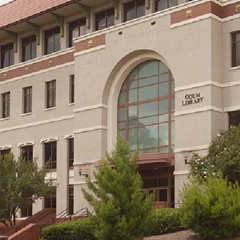Welcome to the Odum Library’s Tech Corner! This is a blog section written by Jeff Gallant- a Reference Librarian, tech enthusiast, and self-professed geek.
At Odum Reference, we’re all about information literacy – being empowered by knowing where information is, how to find it, how to evaluate it, and how to present it. Â We’re not just about books, but also video, music, and valuable digital information that’s often found online. Â That’s why I’m really happy to let you know about the latest ruling in copyright law that affects how we can use digital information and technology.
Extremely important changes have just been made to the Fair Use part of the DMCA (Digital Millenium Copyright Act) by the Librarian of Congress. Â These changes favor you and I, the users, in a big way. Â Here’s how they affect us:
- Lawfully purchased or acquired video media can now be copied and used for criticism and commentary purposes. This means that a film enthusiast can use short clips of a movie within his or her review and know that it’s Fair Use to post these to sites like Youtube. Â However, the use needs to be for educational, documentary, or non-commercial purposes, and that may have to be proven in court during a Fair Use trial.
- Computer programs that restrict interoperability (the ability for a device to work together with applications and networks) can be circumvented, so long as the circumventing is solely to promote interoperability. This means that “jailbreaking” a cell phone’s software, in order to make it work with different companies’ networks and applications that weren’t approved (for example, banned apps in Apple’s App Store), is considered Fair Use. Â However, jailbreaking it to use pirated programs is still illegal, and jailbreaking often leads to voiding a warranty or repair plan.
- Video games that were lawfully obtained and have copyright protection software that restricts access to testing, investigating, and correcting security problems can have that software circumvented under Fair Use. This is only Fair Use if it’s for promoting security for the user or a computer network. Don’t crack open that shiny new PC game just to create some hacks or send it to a pirating website!
- E-book software that restricts access to screen readers and read-aloud software can be circumvented in order to promote accessibility. This is a victory for accessibility, particularly for deaf users that need read-aloud software or screen readers in order to read any book.  This insures that either e-book companies will allow access to this software, or it’s Fair Use to “jailbreak” any accessibility prevention that a company fails to remove. However, this only applies if a company does not provide any audio alternative in e-book format. If a company charged double the price for an audio-only e-book, it’s illegal to jailbreak the cheaper e-book.
This new ruling is all about opening up digital information and technology devices. Â Be sure to check on the latest Fair Use rulings if you are wondering what is Fair Use and what isn’t.
Sources:
“Statement of the Librarian of Congress Relating to Section 1201 Rulemaking” U.S. Copyright Office, accessed Monday, July 26: http://www.copyright.gov/1201/2010/Librarian-of-Congress-1201-Statement.html
“Copyright Office: Jailbreaking an iPhone is Fair Use” PC Magazine, accessed Monday, July 26: http://www.pcmag.com/article2/0,2817,2366993,00.asp



Comments